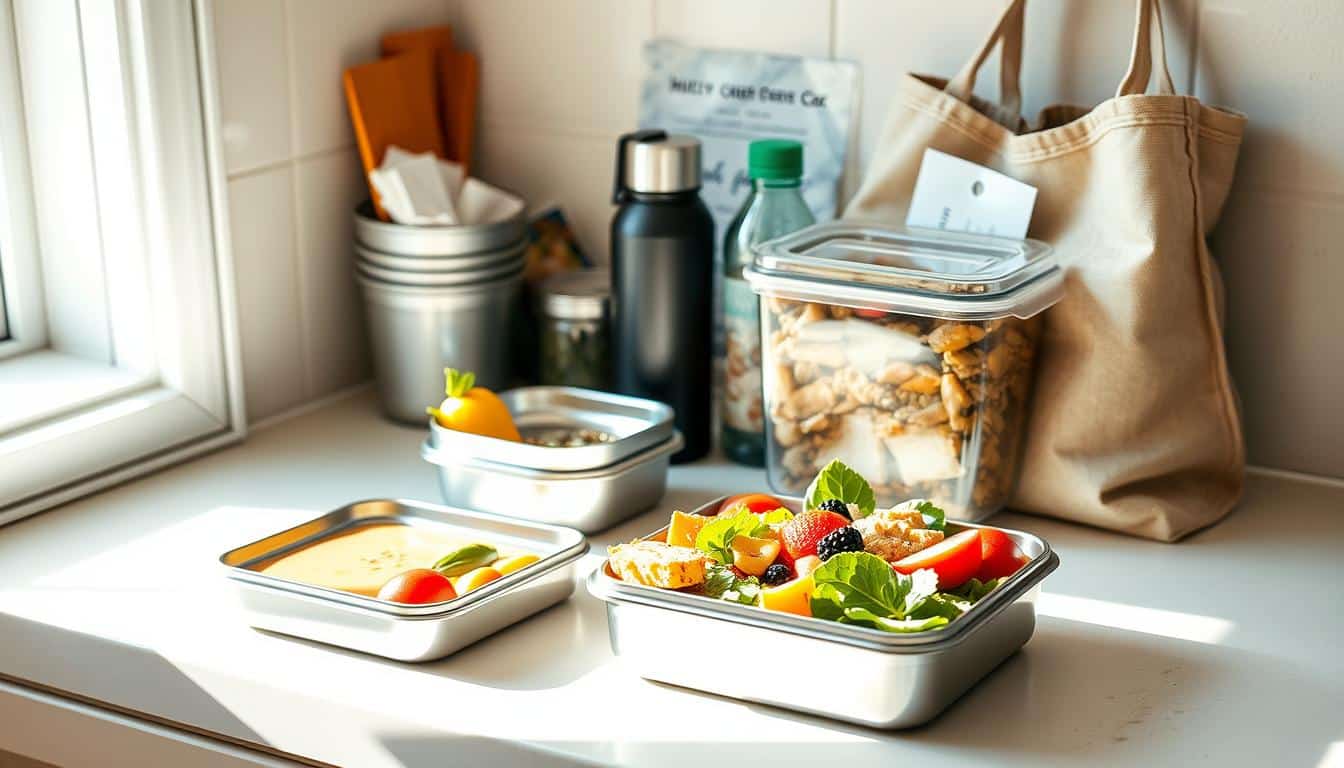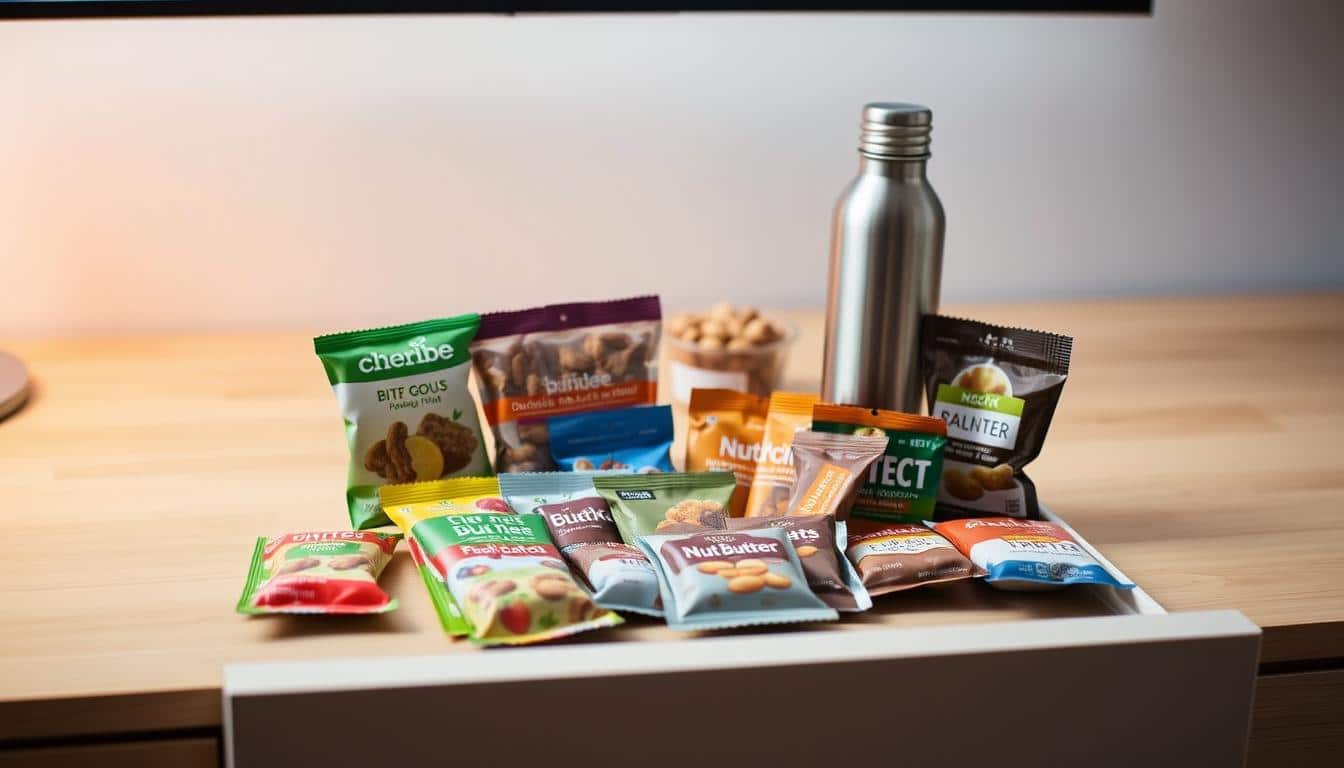Workplaces now need elevator-safe and allergen-free snacks more than before. Many people have food allergies, so it’s important to be welcoming. This guide will talk about the need for safe snacks at work. It will show how these snacks keep everyone safe and aware of food allergies. With easy steps, we can make our offices more inclusive and healthy for everyone.
Understanding Food Allergies in the Workplace
Food allergies are a big issue many people face, including at work. The body mistakes certain foods for threats, leading to allergic reactions. These reactions can be minor or very serious. Knowing about food allergies is key, especially with the high numbers in the U.S.
What is a food allergy?
When someone has a food allergy, their immune system reacts badly. This can cause hives, swelling, stomach problems, or even life-threatening issues. Many different foods can cause these reactions. It’s important to be aware of them to keep the workplace safe for everyone.
Statistics on food allergies among children in the U.S.
About 1 in 13 kids in the U.S. have food allergies, which is around 6 million young people. From 1997 to 2011, there was a 50% jump in child food allergies. These numbers show why it’s crucial to be informed and take action to handle food allergies well.
The Importance of Allergen-Free Snacks
Food allergies change how we share snacks and hang out during lunch at work. They can cause worry and make some feel left out. This hurts how well we work together. Allergen-free snacks make everyone feel welcome and important, making the office a better place.
Impact of food allergies on office dynamics
Food is key for bonding in many offices. But food allergies bring issues such as:
- Limited food choices at events.
- Extra stress for those with allergies, hurting their focus and work.
- Feeling left out or embarrassed because of what they can’t eat.
How allergen-free snacks promote inclusivity
Having allergen-free snacks shows we care about everyone. With safe snacks, we can:
- Join in on fun activities without worrying about allergies.
- Boost how happy and valued employees feel.
- Create a friendly place where everyone can share snacks freely.
Health Risks Associated with Food Allergies
Food allergies can be very dangerous. They might lead to life-threatening situations at work. It’s vital for all workers, especially those who deal with food, to understand these risks. Quick action is needed when someone has a severe allergic reaction, called anaphylaxis, to prevent grave health issues.
Anaphylaxis and its symptoms
Symptoms of anaphylaxis can show up quickly after touching or eating something you’re allergic to. It’s very important to know what these signs are for everyone’s safety. Some common symptoms are:
- Difficulty breathing or wheezing
- Swelling of the throat, face, or tongue
- Gastrointestinal distress, including nausea and vomiting
- Rapid pulse or heartbeat
- Severe skin reactions, such as hives or rash
If anaphylaxis isn’t treated right away, it could lead to very bad outcomes. Knowing what symptoms to look for is key to keeping coworkers safe.
The importance of having a food allergy emergency plan
It’s critical for every workplace to have an emergency plan for food allergies. Employers must make sure all employees know this plan well. A good plan should have:
- Identification of employees with food allergies
- Providing easy access to necessary medications, such as epinephrine auto-injectors
- Clear communication of potential allergen exposures
- Regular training sessions on recognizing anaphylaxis symptoms and responding appropriately
By putting these steps into action, workplaces can become much safer. This reduces the health dangers food allergies pose to all employees.
Common Allergens in Office Snacks
Knowing about common allergens is critical for a safe workplace. The top nine allergens in the US are especially risky for people with food allergies. By managing these allergens well, we make sure everyone can eat safely. It’s important to know these allergens and avoid cross-contact when handling food.
Top nine allergens to avoid
Here are the nine allergens to stay away from in office snacks:
- Milk
- Eggs
- Peanuts
- Tree nuts
- Fish
- Shellfish
- Soy
- Wheat
- Sesame
Understanding cross-contact in food preparation
Cross-contact happens when allergens accidentally get into other foods. This can happen with shared tools, surfaces, or even in the air. To keep food safe, it’s crucial to use clean utensils and surfaces. People making food need to be extra careful to keep allergenic and non-allergenic ingredients separate. Knowing and being careful can greatly lower the risk of allergies at work.
Elevator-Safe Allergen-Free Office Snacks
Choosing the right snacks for an office might seem simple. But it’s crucial for those with food allergies. Elevator-safe snacks must be both handy and safe for everyone. They should be easy to carry and free from common allergens. This approach helps make offices more inclusive and promotes well-being.
Criteria for elevator-safe snacks
Keep these points in mind when picking elevator-safe snacks:
- They should be individually wrapped. This reduces the chance of cross-contamination.
- Look for snacks that don’t need to be refrigerated. This makes them better for storing.
- Choose snacks that are free from major allergens. These include peanuts, tree nuts, gluten, dairy, and soy.
- Pick snacks that are tidy to eat. Messy snacks can be a hassle.
Popular allergen-free snack options
Here are some good choices for allergen-free snacks in elevator settings:
- Look for granola bars that say they are allergen-free.
- Fruits like apples or bananas are a great choice.
- Popcorn can be a good option if it’s made without butter or common allergens.
- Try vegetable sticks with packs of hummus for dipping.
- Choose pretzels that have been checked for allergens.
Choosing Snacks for a Diverse Workplace
Talking clearly about food allergies is crucial for everyone’s safety and comfort. Begin by sharing key facts on common allergens. Also, urge staff to speak up about their food needs. This boosts understanding and support among team members.
How to communicate food allergies among coworkers
Open talks between workers improve how we handle food allergies. Here are ways to do it:
- Hold regular meetings to talk about what foods everyone can enjoy.
- Put labels on snacks to show what’s inside.
- Make a shared document for people to note their food allergies.
Coordinate with HR for safety policies regarding snacks
Working with Human Resources helps make good snack policies. These rules should keep everyone safe while including various snack options. Key steps are:
- Write clear rules on what snacks are okay and which are allergen-free.
- Have training for staff on dealing with allergies at work events.
- Give help to those unsure about which snacks are safe.
Tips for Storing and Serving Allergen-Free Snacks
Storing allergen-free snacks safely is key for keeping people with food allergies safe. It allows offices to be healthy and welcoming places. By using clear allergy labels and keeping snacks well-organized, the chance of mixing them with other foods decreases.
Storage tips for keeping snacks safe
Here are important steps to keep allergen-free snacks safe:
- Keep snacks in clean and clearly labeled containers to avoid confusion and contamination.
- Make sure snack containers are tightly sealed to keep out other food particles.
- Regularly check expiration dates and throw away old snacks to ensure they’re fresh.
- Place snacks in a special spot away from foods that might cause allergies.
Labeling snacks for allergy awareness
Good labeling helps everyone know about allergies. Try these tips:
- Use allergy awareness labels showing the snack doesn’t have common allergens like peanuts.
- Put a full list of ingredients on food containers for more info.
- Teach staff about the importance of these labels so they understand how to store snacks safely.
- Ask everyone to follow the labeling system and keep snacks in their right place.
Preparation of Snack Packs for the Office
Making snack packs ahead of time makes office snacks easy. It ensures everyone finds something they like, no matter their diet. Healthy, ready-to-go snacks mean happier, more focused employees.
Healthy and convenient snack-pack ideas
There are many snack pack choices for different diets. For example:
- Fruit cups filled with an assortment of seasonal fruits
- Nut-free granola bars, perfect for a quick energy boost
- Air-popped popcorn seasoned with a hint of salt
- Veggie sticks accompanied by hummus or a dairy-free dip
- Nut-free trail mix containing seeds and dried fruit
How to customize snack packs for dietary needs
Customizing snacks offers flexibility for everyone’s tastes. Here’s how to do it well:
- Survey employees to identify common dietary restrictions and preferences.
- Create a list of safe snacks that align with those identified needs.
- Offer variety within each snack pack to ensure options for everyone.
- Clearly label all snack packs to enhance allergy awareness.
- Regularly update snack options based on feedback from staff.
Store-Bought vs. Homemade Allergen-Free Snacks
Choosing the right snacks without allergens for work needs careful thought. It’s key to know the differences between homemade and store-bought options. Each has its own positives that affect health and safety at work.
Benefits of homemade allergen-free snacks
Making snacks at home means you know exactly what’s in them. This is super important for people with serious allergies. Advantages include:
- Being able to pick flavors and ingredients that suit personal health needs.
- Ensuring snacks are safe from allergens by controlling the cooking environment.
- Choosing fresh, healthy ingredients that are better for you.
Comparative analysis of store-bought and homemade options
Even though making snacks at home is great, store-bought options offer quickness and variety. Things to think about when choosing include:
- Store-bought snacks are ready-made, saving a lot of preparation time.
- Shops have many different snacks, catering to all kinds of tastes.
- Packaged snacks often have clear labels about allergens, which helps with safety.

Educating Employees about Food Allergies
Teaching workers about food allergies is key to a safe, caring work space. Companies should offer regular training on this topic. This raises awareness and readiness in the team.
Training sessions on allergy awareness
Trainings must address important points about food allergies, like:
- What food allergies are and the dangers they pose.
- How to spot signs of allergic reactions.
- The right way to handle and store foods that cause allergies.
- Ways to help coworkers with food allergies.
Resources for continuous education on food allergies
Beyond the first training, companies can give more materials on food allergies. This keeps staff informed and alert. These materials can be:
- Seminars led by health experts.
- Brochures with crucial info on food allergies.
- Web-based courses for learning at one’s own speed.
Conclusion
Making your workplace safer with allergen-free snacks is super important. It shows that keeping everyone safe from food allergies matters a lot. This helps everyone feel included and appreciated.
Employers can make their offices safer by following this guide. It teaches how to deal with food allergies. This way, they show they care about every employee’s health. It also helps staff work better together.
Adopting these food safety measures makes for a better workplace. It shows understanding and compassion. A safe and fun environment for everyone helps the workplace thrive.



